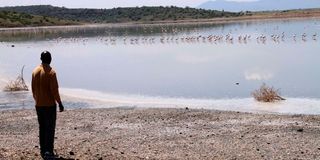Premium
Harassment at Lake Magadi checkpoint not good for Kenyan tourism

A view of Lake Magadi from its shores.
What you need to know:
- When we have visitors from out of Kenya, Lake Magadi is usually high on our list of places to go.
- As it is now, the situation is chaotic, unpleasant, and a blot on one of Kenya’s important tourist landscapes.
Lake Magadi is a special place. It is particularly special for me because it was the subject of my first Gong Places article – 32 years ago.
When we have visitors from out of Kenya, it is usually high on our list of places to go. After the crush and noise of Ngong and Kiserian, from Corner Baridi you drop down the Rift Valley.
On both sides of the road, there are majestic mountains. Along the way, there is the Olorgesailie prehistoric and archaeological site.
On the approach to the lake, you begin to feel the heat, and you see that the land is scorched and eroded. You reach a checkpoint. On your right is the huge Tata soda ash factory; to the left is the township and the way to the lake. When you said where you were going, there was always a welcome and a lifting of the checkpoint’s barrier.
So, I was surprised to read in Trip Adviser several reports from tourists that they have been badly hassled at the checkpoint.
Community fee
Here is one example: “First, some people will stop you on the road, before the gate, to get some money from you. Once at the gate, they asked for Sh4,000 per resident. The guards are in on it, as they don't let you pass if you don't pay this fee.”
From this and other reports, I see that there was also pressure to engage one of the people at the gate as a guide. So, the price went up and sometimes it was even increased after an agreement was made.
I decided to go and find out if this harassment is still happening. I was glad our driver, Peter Kamau, was with me. He was able to hear and understand things that I would have missed.
We enjoyed the drive. The road was much better than we expected. It had been recently patched, and we could have counted the number of potholes on one hand. But the enjoyment stopped as soon as we reached the checkpoint.
There were two security guards, who said they couldn’t lift the barrier for us until we had talked with the two people from the local community who were standing at the roadside. The younger of them told us that there was a community fee to be paid.
Chaotic and unpleasant
I asked how much, and he told us Sh5,000 per person. I asked if there was a lower rate for residents, and he said Sh3,000 per person. I also asked if there would be a receipt for the fee and he didn’t answer. He said he would be our guide and I told him that I had been to the lake many times and we didn’t need a guide.
There was a stalemate – until I explained that I would be writing a story for the Sunday Nation. At this point, one of the security guards started to use his phone. Eventually, he took our details, produced two visitor tabs, and told us to go to see Anthony Wanjohi, the Finance Manager of Tata Chemicals Limited.
So, once through the checkpoint, we turned right instead of left and proceeded to the factory’s admin block. Anthony welcomed us, listened to our description of what had happened at the barrier, said it was an issue of concern to the company, and said he would make a report for the company’s Managing Director.
As I told the Finance Manager, I would be happy to pay a community fee, as levied in conservancies across the country – as long as the payment process is organised, made public and receipted. It seems that Tata Chemicals has a lease that includes Lake Magadi.
But there are other important stakeholders: the national government, the county government and the local community. They all need to be involved in an agreement about how access to Lake Magadi is managed. As it is now, the situation is chaotic, unpleasant, and a blot on one of Kenya’s important tourist landscapes.
John Fox is Chairman of iDC. Email: [email protected]





